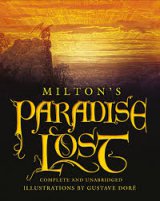Paradise Lost
Paradise Lost is an epic poem in blank verse by the 17th-century English poet John Milton. The first version, published in 1667, consisted of ten books with over ten thousand lines of verse. A second edition followed in 1674, arranged into twelve books with minor revisions throughout and a note on the versification.
BOOK I. Of Mans First Disobedience, and the Fruit Of that Forbidden Tree, whose mortal tast Brought Death into the World, and all our woe, With loss of Eden, till one greater Man Restore us, and regain the blissful Seat, Sing Heav’nly Muse, that on the secret top Of Oreb, or of Sinai, didst inspire That Shepherd, who first taught the chosen Seed, In the Beginning how the Heav’ns and Earth Rose out of Chaos: Or if Sion Hill Delight thee more, and Siloa’s Brook that flow’d Fast by the Oracle of God; I thence Invoke thy aid to my adventrous Song, That with no middle flight intends to soar Above th’ Aonian Mount, while it pursues Things unattempted yet in Prose or Rhime. And chiefly Thou O Spirit, that dost prefer Before all Temples th’ upright heart and pure, Instruct me, for Thou know’st; Thou from the first Wast present, and with mighty wings outspread Dove-like satst brooding on the vast Abyss And mad’st it pregnant: What in me is dark Illumine, what is low raise and support; That to the highth of this great Argument I may assert th’ Eternal Providence, And justifie the wayes of God to men. Say first, for Heav’n hides nothing from thy view Nor the deep Tract of Hell, say first what cause Mov’d our Grand Parents in that happy State, Favour’d of Heav’n so highly, to fall off From their Creator, and transgress his Will For one restraint, Lords of the World besides? Who first seduc’d them to that fowl revolt? Th’ infernal Serpent; he it was, whose guile Stird up with Envy and Revenge, deceiv’d The Mother of Mankinde, what time his Pride Had cast him out from Heav’n, with all his Host Of Rebel Angels, by whose aid aspiring To set himself in Glory above his Peers, He trusted to have equal’d the most High, If he oppos’d; and with ambitious aim Against the Throne and Monarchy of God Rais’d impious War in Heav’n and Battel proud With vain attempt. Him the Almighty Power Hurld headlong flaming from th’ Ethereal Skie With hideous ruine and combustion down To bottomless perdition, there to dwell In Adamantine Chains and penal Fire, Who durst defie th’ Omnipotent to Arms. Nine times the Space that measures Day and Night To mortal men, he with his horrid crew Lay vanquisht, rowling in the fiery Gulfe Confounded though immortal: But his doom Reserv’d him to more wrath; for now the thought Both of lost happiness and lasting pain Torments him; round he throws his baleful eyes That witness’d huge affliction and dismay Mixt with obdurate pride and stedfast hate: At once as far as Angels kenn he views The dismal Situation waste and wilde, A Dungeon horrible, on all sides round As one great Furnace flam’d, yet from those flames No light, but rather darkness visible Serv’d only to discover sights of woe, Regions of sorrow, doleful shades, where peace And rest can never dwell, hope never comes That comes to all; but torture without end Still urges, and a fiery Deluge, fed With ever-burning Sulphur unconsum’d: Such place Eternal Justice had prepar’d For those rebellious, here their Prison ordain’d In utter darkness, and their portion set As far remov’d from God and light of Heav’n As from the Center thrice to th’ utmost Pole. O how unlike the place from whence they fell! There the companions of his fall, o’rewhelm’d With Floods and Whirlwinds of tempestuous fire, He soon discerns, and weltring by his side One next himself in power, and next in crime, Long after known in Palestine, and nam’d Beelzebub. To whom th’ Arch-Enemy, And thence in Heav’n call’d Satan, with bold words Breaking the horrid silence thus began. If thou beest he; But O how fall’n! how chang’d From him, who in the happy Realms of Light Cloth’d with transcendent brightnes didst outshine Myriads though bright: If he whom mutual league, United thoughts and counsels, equal hope, And hazard in the Glorious Enterprize, Joynd with me once, now misery hath joynd In equal ruin: into what Pit thou seest From what highth fal’n, so much the stronger provd He with his Thunder: and till then who knew The force of those dire Arms? yet not for those Nor what the Potent Victor in his rage Can else inflict do I repent or change, Though chang’d in outward lustre; that fixt mind And high disdain, from sence of injur’d merit, That with the mightiest rais’d me to contend, And to the fierce contention brought along Innumerable force of Spirits arm’d That durst dislike his reign, and me preferring, His utmost power with adverse power oppos’d In dubious Battel on the Plains of Heav’n, And shook his throne. What though the field be lost? All is not lost; the unconquerable Will, And study of revenge, immortal hate, And courage never to submit or yield: And what is else not to be overcome? That Glory never shall his wrath or might Extort from me. To bow and sue for grace With suppliant knee, and deifie his power Who from the terrour of this Arm so late Doubted his Empire, that were low indeed, That were an ignominy and shame beneath This downfall; since by Fate the strength of Gods And this Empyreal substance cannot fail, Since through experience of this great event In Arms not worse, in foresight much advanc’t, We may with more successful hope resolve To wage by force or guile eternal Warr Irreconcileable, to our grand Foe, Who now triumphs, and in th’ excess of joy Sole reigning holds the Tyranny of Heav’n. So spake th’ Apostate Angel, though in pain, Vaunting aloud, but rackt with deep despare: And him thus answer’d soon his bold Compeer. O Prince, O Chief of many Throned Powers, That led th’ imbattelld Seraphim to Warr Under thy conduct, and in dreadful deeds Fearless, endanger’d Heav’ns perpetual King; And put to proof his high Supremacy, Whether upheld by strength, or Chance, or Fate, Too well I see and rue the dire event, That with sad overthrow and foul defeat Hath lost us Heav’n, and all this mighty Host In horrible destruction laid thus low, As far as Gods and Heav’nly Essences Can Perish: for the mind and spirit remains Invincible, and vigour soon returns, Though all our Glory extinct, and happy state Here swallow’d up in endless misery. But what if he our Conquerour, (whom I now Of force believe Almighty, since no less Then such could hav orepow’rd such force as ours) Have left us this our spirit and strength intire Strongly to suffer and support our pains, That we may so suffice his vengeful ire, Or do him mightier service as his thralls By right of Warr, what e’re his business be Here in the heart of Hell to work in Fire, Or do his Errands in the gloomy Deep; What can it then avail though yet we feel Strength undiminisht, or eternal being To undergo eternal punishment? Whereto with speedy words th’ Arch-fiend reply’d. Fall’n Cherube, to be weak is miserable Doing or Suffering: but of this be sure, To do ought good never will be our task, But ever to do ill our sole delight, As being the contrary to his high will Whom we resist. If then his Providence Out of our evil seek to bring forth good, Our labour must be to pervert that end, And out of good still to find means of evil; Which oft times may succeed, so as perhaps Shall grieve him, if I fail not, and disturb His inmost counsels from their destind aim. But see the angry Victor hath recall’d His Ministers of vengeance and pursuit Back to the Gates of Heav’n: The Sulphurous Hail Shot after us in storm, oreblown hath laid The fiery Surge, that from the Precipice Of Heav’n receiv’d us falling, and the Thunder, Wing’d with red Lightning and impetuous rage, Perhaps hath spent his shafts, and ceases now To bellow through the vast and boundless Deep. Let us not slip th’ occasion, whether scorn, Or satiate fury yield it from our Foe. Seest thou yon dreary Plain, forlorn and wilde, The seat of desolation, voyd of light, Save what the glimmering of these livid flames Casts pale and dreadful? Thither let us tend From off the tossing of these fiery waves, There rest, if any rest can harbour there, And reassembling our afflicted Powers, Consult how we may henceforth most offend Our Enemy, our own loss how repair, How overcome this dire Calamity, What reinforcement we may gain from Hope, If not what resolution from despare.
Translation
Translate and read this book in other languages:
Select another language:
- - Select -
- 简体中文 (Chinese - Simplified)
- 繁體中文 (Chinese - Traditional)
- Español (Spanish)
- Esperanto (Esperanto)
- 日本語 (Japanese)
- Português (Portuguese)
- Deutsch (German)
- العربية (Arabic)
- Français (French)
- Русский (Russian)
- ಕನ್ನಡ (Kannada)
- 한국어 (Korean)
- עברית (Hebrew)
- Gaeilge (Irish)
- Українська (Ukrainian)
- اردو (Urdu)
- Magyar (Hungarian)
- मानक हिन्दी (Hindi)
- Indonesia (Indonesian)
- Italiano (Italian)
- தமிழ் (Tamil)
- Türkçe (Turkish)
- తెలుగు (Telugu)
- ภาษาไทย (Thai)
- Tiếng Việt (Vietnamese)
- Čeština (Czech)
- Polski (Polish)
- Bahasa Indonesia (Indonesian)
- Românește (Romanian)
- Nederlands (Dutch)
- Ελληνικά (Greek)
- Latinum (Latin)
- Svenska (Swedish)
- Dansk (Danish)
- Suomi (Finnish)
- فارسی (Persian)
- ייִדיש (Yiddish)
- հայերեն (Armenian)
- Norsk (Norwegian)
- English (English)
Citation
Use the citation below to add this book to your bibliography:
Style:MLAChicagoAPA
"Paradise Lost Books." Literature.com. STANDS4 LLC, 2025. Web. 22 Feb. 2025. <https://www.literature.com/book/paradise_lost_101>.








Discuss this Paradise Lost book with the community:
Report Comment
We're doing our best to make sure our content is useful, accurate and safe.
If by any chance you spot an inappropriate comment while navigating through our website please use this form to let us know, and we'll take care of it shortly.
Attachment
You need to be logged in to favorite.
Log In